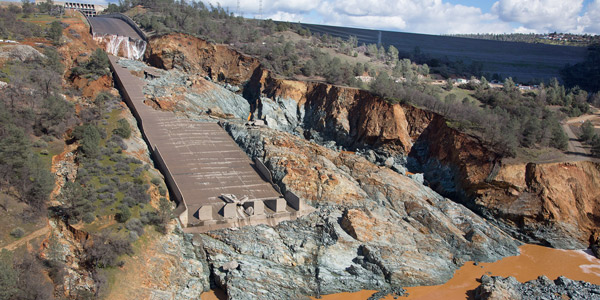By Jason Fordney
Controversy is swelling over the February 2017 spillway collapse at the Oroville Dam in Northern California, after local officials last week filed a scathing lawsuit alleging corruption at the state’s main water agency and lawmakers called for FERC to delay the facility’s relicensing.
“Decades of mismanagement and intentional lack of maintenance” by the California Department of Water Resources led to the federally declared disaster, according to allegations in the Jan. 17 lawsuit filed by the City of Oroville against the department. Filed with the California superior court in Butte County, the suit describes maintenance issues and a culture of poor supervision, fabricated inspection reports and corruption at the agency.
“For years, DWR supervisors were more interested in lining their own pockets than ensuring the safety of the facility and its workers. Important maintenance projects were delayed or never completed, and substandard supplies were used to address vulnerabilities in the dam’s armored spillway,” the lawsuit alleges.
Oroville is home to the Hyatt and Thermalito power plants totaling 933 MW of capacity, which had to be shut down during the incident. During the dam’s 2005 FERC relicensing proceeding, three environmental groups requested that the state pave the hillside below the emergency spillway to avoid erosion. The spillway failure generated criticism of both the DWR and FERC for ignoring the previous warnings. (See Local Officials Appeal to FERC as Oroville Water Levels Recede.)
The court filing alleges a “toxic culture” at the department, describing incidents of racist and sexist behavior, employee theft and other corruption. It describes how events around the incident unfolded, including the interaction of local law enforcement with DWR officials prior to and during the evacuation, which caused chaotic and dangerous road conditions and massive traffic jams. A complaint filed through the state Government Claims Program over the Oroville situation was rejected last July because it was determined it would be better resolved by the courts, the lawsuit says.
The lawsuit does not specify financial damages but does cite physical damage to city infrastructure, equipment and personal property as well as costs related to the evacuation, loss of tax and tourism revenue, and emergency and law enforcement services.
DWR spokesperson Erin Mellon said the department does not comment on pending litigation.
On Friday, U.S. Rep. John Garamendi (D), whose district is near Oroville, petitioned FERC to postpone the pending relicensing of the dam, citing the incident and saying “a failure by FERC to delay relicensing of the Oroville Dam would be a serious abdication of its regulatory responsibility.” A week earlier, nearly two dozen California state legislators filed in support of delaying the license.
Blowback over New DWR Director
The DWR has had four directors since the beginning of 2017, when Bill Croyle took over as acting director after Mark Cowin’s nearly seven-year stint. Cindy Messer briefly took over from Croyle in July 2017 until Gov. Jerry Brown appointed Grant Davis to the role.
Davis only led the department until this month, resigning after an independent forensics team released its report on the dam failure. (See Report: Regulatory Failure Caused Oroville Incident.) He was the signatory to the department’s Dec. 20 relicensing application to FERC, and he noted that the spillway incident followed California’s wettest January and February in more than a century.
Brown appointed Karla Nemeth to replace Davis on Jan. 10. That decision has stirred controversy, as The Sacramento Bee reported last week, because Nemeth is married to Tom Philp, executive strategist of the Metropolitan Water District of Southern California, a key member of a group of public agencies known as the State Water Contractors, which are the main recipients of water stored behind the Oroville Dam.
The City of Oroville’s lawsuit alleges the State Water Contractors “lobbied DWR to defer maintenance at [State Water Project] facilities, in order to reduce their own costs” and used their influence to defer needed maintenance at the facility.
Metropolitan Water District is also involved with negotiations around Brown’s $17.1 billion water tunnels proposal, a large-scale project opposed by many Northern California officials and environmentalists.



